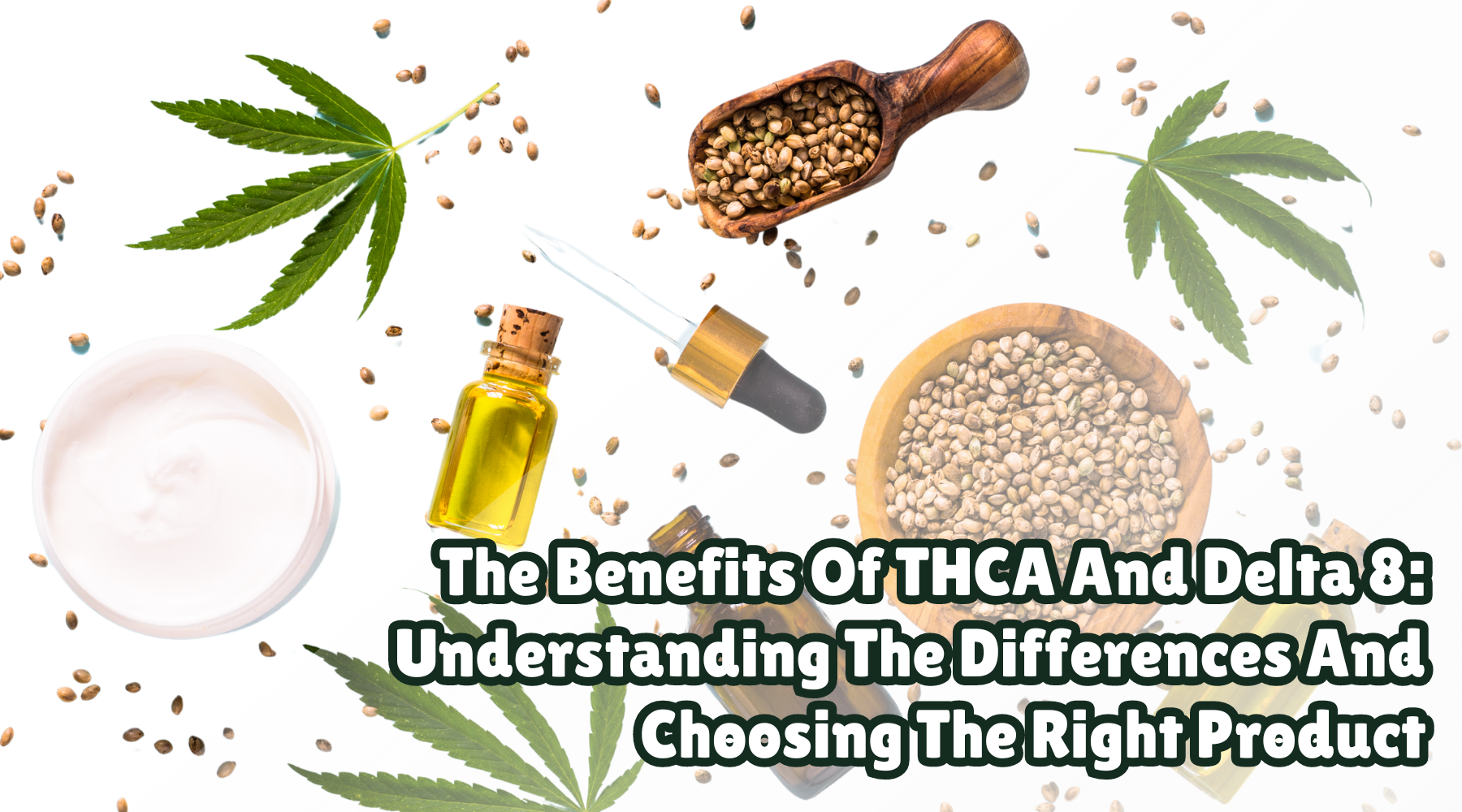The Benefits Of THCA And Delta 8: Understanding The Differences And Choosing The Right Product

As the world of cannabis continues to evolve, two compounds have gained significant attention: THCA (Tetrahydrocannabinolic Acid) and Delta 8 THC. While both are derived from the cannabis plant, they offer distinct benefits and experiences. In this article, we’ll dive deep into the benefits of THCA and Delta 8, explore their differences, and help you choose the right product for your needs.
What is THCA?
THCA, or Tetrahydrocannabinolic Acid, is a non-psychoactive cannabinoid found in raw and live cannabis. Unlike THC, which is known for its psychoactive effects, THCA does not produce a "high." It’s only when THCA is exposed to heat (through smoking, vaping, or cooking) that it converts to THC, the compound responsible for the psychoactive effects.
Benefits of THCA
- Anti-Inflammatory Properties: THCA is known for its potent anti-inflammatory effects, making it beneficial for conditions like arthritis and other inflammatory disorders.
- Neuroprotective Effects: Emerging research suggests that THCA may have neuroprotective properties, potentially aiding in the prevention of neurodegenerative diseases like Alzheimer’s and Parkinson’s.
- Anti-Nausea: THCA has shown promise in reducing nausea and vomiting, particularly in patients undergoing chemotherapy.
- Appetite Stimulation: THCA can help stimulate appetite, which is especially useful for those dealing with conditions that cause loss of appetite.
- Antioxidant Properties: THCA acts as a powerful antioxidant, protecting cells from damage caused by free radicals.
What is Delta 8 THC?
Delta 8 THC is a minor cannabinoid that is chemically different from Delta 9 THC (the main psychoactive compound in cannabis) by just a few atomic bonds. This slight difference results in a milder psychoactive effect, offering users a more controlled and relaxed experience.
Benefits of Delta 8 THC
- Mild Psychoactive Experience: Unlike Delta 9 THC, Delta 8 offers a more subtle "high," making it ideal for those who want the benefits of THC without intense psychoactive effects.
- Anxiety Relief: Delta 8 is known for its anxiety-reducing properties. It provides a calming effect without the paranoia or anxiety that some experience with Delta 9 THC.
- Pain Relief: Delta 8 has analgesic properties that can help in managing pain, making it a good option for those with chronic pain conditions.
- Enhanced Focus and Clarity: Many users report that Delta 8 helps with focus and mental clarity, which can be beneficial during work or creative tasks.
- Improved Sleep: Due to its calming effects, Delta 8 can aid in sleep, helping users who struggle with insomnia or other sleep disorders.
THCA vs. Delta 8: Understanding the Differences
While both THCA and Delta 8 THC offer unique benefits, they are different in several key ways:
- Psychoactive Effects: THCA is non-psychoactive, meaning it won’t get you "high." Delta 8, on the other hand, offers mild psychoactive effects, providing a more relaxed and clear-headed experience.
- Usage: THCA is often consumed in raw cannabis forms, such as in smoothies, juices, or as part of a wellness regimen. Delta 8 is usually found in products like vapes, edibles, and tinctures designed for those seeking mild euphoria.
- Conversion: THCA converts to THC when exposed to heat, while Delta 8 is already an active compound that doesn’t require conversion.
- Legality: While the legality of Delta 8 is somewhat ambiguous and varies by state, THCA is legal in its raw form in most places, as it does not have psychoactive properties until it is decarboxylated.
How to Choose the Right Product
Choosing between THCA and Delta 8 largely depends on your personal needs and preferences. Here are some factors to consider:
- Desired Effects: If you’re looking for non-psychoactive health benefits, THCA might be the right choice. For those seeking mild psychoactive effects without the intensity of Delta 9 THC, Delta 8 is a better fit.
- Consumption Method: Consider how you prefer to consume cannabis. THCA is best enjoyed in raw forms, while Delta 8 is typically consumed through vaping, edibles, or tinctures.
- Legal Considerations: Make sure to check the legal status of Delta 8 in your state or country before purchasing, as it can vary widely.
Common Questions About THCA and Delta 8
1. Can THCA get you high?
- No, THCA in its raw form is non-psychoactive. It only becomes psychoactive when converted to THC through heating.
2. Is Delta 8 THC legal?
- The legality of Delta 8 is complex and varies by state. While it is federally legal under the 2018 Farm Bill, some states have banned its sale and use.
3. Can I use THCA for pain relief?
- Yes, THCA has anti-inflammatory properties that can help with pain relief, particularly for inflammatory conditions.
4. What is the best way to consume Delta 8?
- Delta 8 is most commonly consumed through vaping, edibles, or tinctures. The best method depends on your personal preference and how quickly you want to feel the effects.
5. How does Delta 8 compare to Delta 9 THC?
- Delta 8 is less potent than Delta 9 THC and provides a milder, more controlled high with fewer side effects like anxiety or paranoia.
Conclusion
Both THCA and Delta 8 THC offer unique benefits that can cater to different needs. Whether you’re looking for non-psychoactive wellness benefits or a mild, enjoyable high, there’s a product out there for you. At SweetLyfe, we offer a wide range of THCA and Delta 8 products to suit your lifestyle. Explore our selection today and find the perfect product to enhance your well-being.
